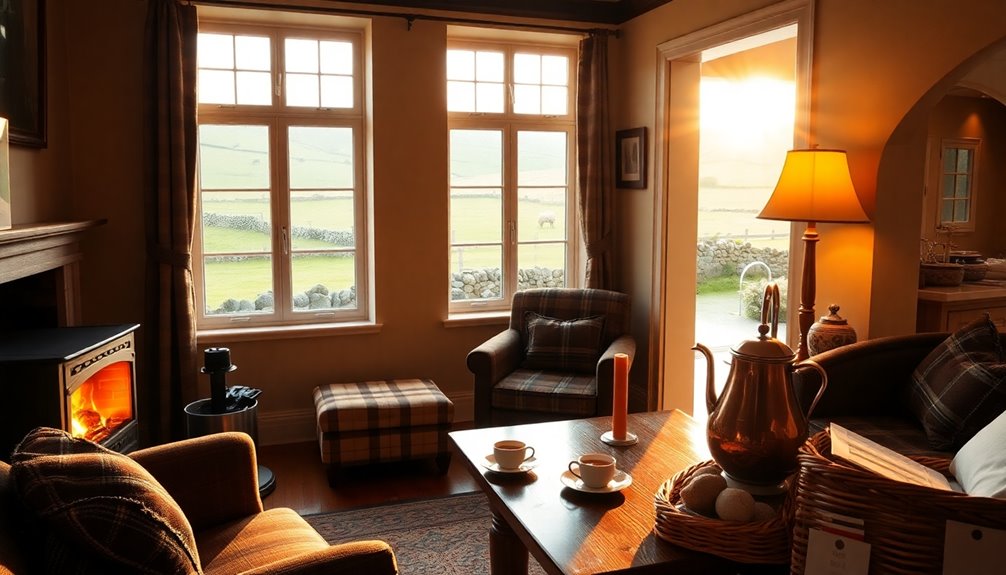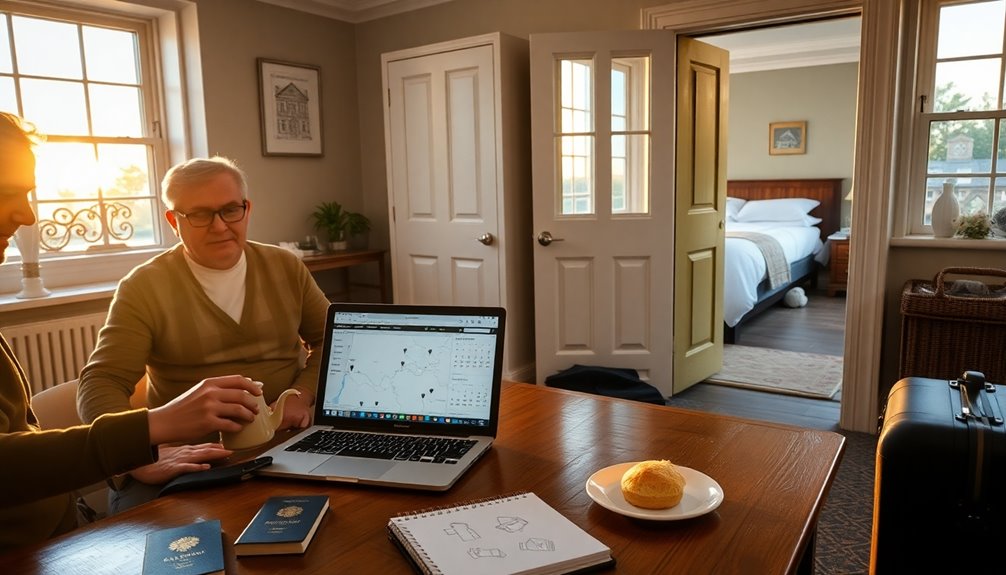
Homestay in Ireland lets you live with local hosts who offer a private or shared room, meals, and cultural immersion while respecting your independence. You’ll find options in cities, towns and near universities, with clear fees, meal plans and house rules agreed up front. Hosts usually handle dietary needs if told early, outline transport links and safety tips, and give emergency contacts. If anything goes wrong you’ll have local support — keep going to learn practical booking, costs and etiquette tips.
Highlights
- Homestays in Ireland typically include a private or shared room, daily meals (often breakfast and dinner), and Wi‑Fi.
- Hosts accommodate dietary needs and allergies if informed before arrival and may label ingredients or use separate prep areas.
- Expect clear house rules, quiet hours, laundry arrangements, and basic security like locks and outdoor lighting.
- Costs vary by location and amenities; ask for written fees, placement charges, and any extra costs (laundry, airport pick‑up).
- Transport options depend on location: walking/cycling in towns, regular public transport in cities, and regional buses/trains in rural areas.
What Is Homestay and How Does It Work in Irish Cities?
While staying with a local family, you’ll live in a private or shared room, eat some meals with hosts, and get a day-to-day immersion in Irish life — from tea-time conversations to tips on getting around the city. You’ll follow house routines, learn local customs, and practice English naturally. Hosts offer guidance but respect your independence, so you can explore freely between homestay meals. Cultural immersion means joining modest traditions — weekend markets, family dinners, or a ceilidh invite — while having quiet space when you want it. Clear communication on rules, meals, and privacy keeps everything comfortable and simple.
Which Cities Offer the Best Homestay Options for Students?
When choosing a homestay in Ireland, you’ll find top options in cities like Dublin, Cork, Galway and Limerick, each offering different vibes and student communities. Dublin stands out for its wide range of host families, easy access to universities and rich cultural life, though it can be pricier. Consider what matters most to you—transport links, social scene or quieter study time—when weighing these cities.
Top Cities for Homestays
Although every Irish city has its own charm, some stand out for homestays because they combine safe neighbourhoods, convenient transport, and hosts experienced in hosting international students. You’ll find popular destinations like Galway, Cork, and Limerick offering warm families and easy access to language schools. If you want lively arts, Galway’s festivals and trad sessions deliver cultural experiences while remaining relaxed. Cork mixes city buzz with friendly suburbs; Limerick gives affordable options and strong community ties. You’ll enjoy reliable public transport, bike-friendly routes, and hosts who respect your independence, making settling in simple and enjoyable.
Perks of Dublin Living
Because Dublin blends historic charm with modern convenience, you’ll find homestays that suit almost any student lifestyle — from quiet suburbs near Trinity College to lively neighbourhoods around Camden Street. You’ll immerse in Dublin culture through friendly hosts, weekend markets, and cafés serving local cuisine. City amenities mean easy access to libraries, gyms, and vibrant shopping districts. Reliable public transport connects you to campuses and outdoor activities along the Liffey or coastal walks. Nightlife options and a diverse social life help you make friends fast. If you want freedom with support, Dublin’s homestays offer independence without isolation.
How Do I Find and Book a Homestay in Ireland?

When you’re ready to find a homestay in Ireland, start by checking reputable platforms, university housing offices, and local agencies to compare locations and host profiles. Apply by submitting clear references, your arrival dates and any dietary or study needs, and ask hosts specific questions about house rules and transport links. Once you’ve chosen a match, confirm booking terms, pay securely through the provider’s recommended method, and get a written receipt and arrival instructions.
Where to Look
Wondering where to start? Look online at trusted homestay platforms and official tourism sites to compare hosts, locations, and reviews. Also contact local agencies—especially in university towns and rural counties—for curated options and cultural match-making. Check neighbourhoods for transport links, quiet vs. social households, and proximity to work or study. Read profiles closely: dietary needs, language practice, house rules. Join expat or travel forums and social media groups to get real experiences and quick tips. Book directly through vetted platforms or agencies that offer secure payment and clear cancellation policies so you keep freedom and peace of mind.
How to Apply
Now that you’ve scoped where to look, it’s time to put plans into action and apply for a homestay. You’ll follow a clear application process: create a profile, list your dates and preferences, and message potential hosts. Be honest about lifestyle needs — Wi‑Fi, dietary habits, pets — so matches feel natural. Gather required documents like ID, visa details, and references; some hosts ask for a short intro video. Ask about house rules and cultural expectations before confirming. Stay flexible, trust your instincts, and choose a family that supports your independence while offering authentic Irish hospitality.
Booking and Payment
Looking for and booking a homestay in Ireland is straightforward if you follow a few practical steps: search reputable platforms or school partner lists, filter by dates, location and must-have amenities, then contact several hosts to compare options and clarify house rules, meal arrangements and cancellation terms. Once you’ve chosen, follow the booking process on the platform or with the agency, confirm arrival details, and request a written agreement. Ask about accepted payment methods—card, bank transfer or platform escrow—and any deposits. Keep receipts, understand refund timelines, and stay flexible to enjoy local hospitality and freedom during your stay.
What Costs and Fees Should Students Expect in Homestays?

Because homestay costs vary by location, host family amenities, and whether meals are included, you should budget for a few predictable fees: weekly or monthly accommodation charges, a placement or agency fee when you book, and occasional extras like laundry, utilities surcharges, or airport pick-up. Think of a clear cost breakdown so you can compare offers and keep freedom to choose. Ask hosts and agencies for written fee lists to expose hidden fees—tourist taxes, late checkout, or extra guests. Plan a small contingency fund for social activities, transport, or unexpected expenses, and negotiate terms before you arrive.
What Is Typically Included in a Homestay Room and Meal Plan?
You’ll usually get a private or single-occupancy room with basic amenities like a bed, storage, clean linens, Wi‑Fi and sometimes a desk or heater depending on the house. Meal plans typically include breakfast and either packed or cooked evening meals at set times, with tea culture and occasional weekend variations being common in Ireland. Hosts will also explain house rules—bathroom schedules, laundry, and shared-space etiquette—so everyone knows how to get along.
Room Basics and Amenities
While specific offerings vary between families, a typical homestay room in Ireland will give you a comfortable private bedroom with a bed, storage (wardrobe or chest of drawers), a bedside table and lamp, fresh bedding and towels, and reliable Wi‑Fi; many hosts also provide a desk or chair for study and a mirror. Your room setup usually includes heating, curtains or blinds for privacy, and access to shared bathroom facilities unless otherwise agreed. Essential amenities often cover laundry use, tea/coffee access, and basic toiletries. Hosts respect your independence while offering helpful local tips and a welcoming, homey environment.
Meal Plans and Timings
Curious about meals in an Irish homestay? You’ll usually find clear meal types—breakfast, a packed lunch or light lunch, and a hearty evening meal—often reflecting local produce and simple comforts. Hosts commonly offer breakfast options you can choose between, and dinner is family-style so you’ll share dishes at predictable dining schedules, typically morning, midday and early evening. Vegetarian or dietary needs are usually accommodated if you tell your host in advance. You’ll enjoy relaxed pacing and occasional treats like scones or stew. This setup gives you routine without rigidity, letting you explore while feeling well nourished.
House Rules and Sharing
Because homes are lived-in spaces, hosts set clear but friendly rules about rooms, mealtimes and shared areas so everyone knows what to expect. You’ll usually get a private or semi-private room with bedding, storage, and occasional laundry; meals vary from full board to breakfast-only, with shared kitchens sometimes available. Hosts explain house etiquette — quiet hours, guest sign-in, cleaning schedules — and you’re expected to respect communal spaces. Guest responsibilities include notifying hosts of plans, washing up after meals, and following recycling rules. This balance gives you independence while honoring local customs and the household’s rhythm.
How Do Homestays Support International Students’ Language and Cultural Needs?
How will living with an Irish host family help you improve language skills and adapt to local customs? You’ll get daily language immersion through natural conversation, mealtimes, errands and shared activities, boosting fluency faster than classroom practice alone. Hosts offer cultural exchange: local stories, traditions, slang and holiday customs that help you read social cues and join community life. You’ll learn practical phrases, listen to regional accents, and receive gentle correction while retaining independence to explore. Homestays balance structured support with freedom, so you build confidence speaking, navigate norms respectfully, and shape your own cultural learning journey.
What Are the Rules, Curfews, and House Etiquette in Irish Homestays?
Wondering what to expect around rules and curfews in an Irish homestay? You’ll usually find clear house expectations set by your host: quiet hours, kitchen use, laundry routines and guests’ policies. Curfews aren’t strict for adults but you’ll agree sensible arrival times so everyone sleeps well. Be punctual for meals, clean up after yourself, and ask before using shared spaces. Hosts appreciate open communication when plans change — it’s part of cultural adaptation and respect. Flexibility is welcomed, but freedom comes with responsibility: follow agreed rules, show courtesy, and you’ll enjoy a smooth, respectful stay.
How Safe Are Homestay Neighborhoods and What Security Measures Exist?
Curious about safety where you’ll be staying? You’ll find most homestay neighborhoods in Ireland are calm, community-minded places where neighbors look out for each other. Hosts usually brief you on local neighborhood safety, safe walking routes, and emergency contacts. Security measures vary—locks on doors and windows, outdoor lighting, and sometimes alarm systems—but hosts will explain what’s in place and how to use it. You’re encouraged to lock up, register valuable items, and keep personal belongings secure. If you crave independence, ask about nighttime safety and nearby help so you can explore confidently and responsibly.
What Transportation and Commuting Options Are Common From Homestays?

Because homestays are usually located in residential areas, you’ll find a mix of transport options depending on whether you’re in a city, town, or rural village. You’ll often walk or cycle to nearby shops and hosts will point out safe routes. In cities, reliable public transport—buses, trams, and trains—connect you to universities and nightlife. In smaller towns regional buses and rail links run less frequently, so plan schedules. Taxi services are available for late trips or remote drop-offs; apps work in urban areas but rural rides may need phone bookings. Hosts can advise on passes, timetables, and bike rentals.
How Do Homestays Accommodate Dietary Restrictions and Allergies?
How will your host handle your food needs? You’ll discuss dietary preferences before arrival — veggies, vegan, halal, gluten-free — and hosts gladly adapt meals or label ingredients. For serious allergies, they’ll outline allergy accommodations: separate prep areas, dedicated utensils, or avoiding cross-contact foods. You can share recipes or shop together to keep control and enjoy local Irish cuisine with tweaks. Hosts often appreciate cultural notes and clear communication, so you’ll feel respected and free to choose. If something’s uncertain, ask for meal examples or to meet the cook; most homestays want you safe, comfortable, and happily fed.
What Are the Cancellation, Extension, and Emergency Policies?
Need to change your dates or worried about an emergency? You’ll find clear cancellation policies that explain deadlines, refunds, and any fees so you can plan boldly. If your travel shifts, notify your coordinator early—extension requests are handled case-by-case, balancing host availability with your freedom to stay longer. In urgent situations, hosts and agencies prioritize safety: emergency contact protocols, temporary accommodation options, and local support services are activated promptly. Always keep travel insurance and emergency contacts handy, read terms before booking, and communicate openly—this keeps arrangements flexible, respectful, and aligned with Irish cultural hospitality.
How Can Students Resolve Issues or Raise Concerns With Their Host Family?
If plans change or an emergency has just been handled, you might still face smaller day-to-day issues with your host family — and it helps to know the best way to raise them calmly and constructively. Start with private, respectful conversation: describe the issue, how it affects you, and suggest solutions. Use clear communication strategies—listen, ask for clarification, and agree boundaries. If things don’t improve, contact your homestay coordinator early for mediation and established conflict resolution steps. Keep records of conversations and outcomes. You’re entitled to a safe, respectful stay, and taking measured action preserves your independence and wellbeing.
Some Questions Answered
Can I Bring a Pet or Request a Pet-Free Home?
Yes — you can ask about pet accommodations or request a pet-free home. When booking, you’ll state preferences and any allergies or needs; hosts list homestay policies so everyone’s comfortable. You’ll get details about pet types, areas allowed, and cleaning routines. If freedom’s important, choose hosts who respect your space and confirm arrangements in writing. That way you’ll avoid surprises and enjoy a respectful, culturally-aware stay.
Are Utilities and Internet Usage Limits Included?
Usually yes, but it depends: utilities coverage often includes heating, water and electricity, while internet availability is commonly provided, though some hosts set usage limits. You’ll want to check the house rules and ask about peak-time restrictions or extra charges. If you value freedom, clarify download caps and backup options beforehand. That way you won’t be surprised by bills or slow speeds, and you’ll stay connected without constraints.
Do Hosts Provide Laundry Facilities and Costs?
Yes — hosts usually offer laundry availability, though specifics vary. You’ll often get access to a washer/dryer or shared laundry area; some hosts do laundry for you. Laundry costs might be included in your fee, charged per load, or require you to pay for detergent and machine use. Ask before arrival so you can plan. You’ll appreciate the flexibility and respectful household norms around scheduling and drying.
Can I Receive Mail or Packages at the Homestay Address?
Yes — about 72% of homestays accept mail delivery for guests, so you can usually receive letters and parcels. You’ll want to check with your host about package handling rules: some hold items at no charge, others ask you to collect promptly or pay a small fee. Be respectful of space and privacy, provide clear recipient details, and confirm any customs or courier restrictions to keep things smooth while you enjoy local freedom.
Is Short-Term Storage Available During School Breaks?
Yes — you can usually arrange short-term storage during school breaks. You’ll find flexible storage options through your host or local providers, depending on break duration and space. Hosts often offer limited luggage storage for free, while private facilities handle longer stays or larger items. Ask early about costs, insurance, access times and cultural norms for leaving personal belongings, so you’ll have freedom and peace of mind while you travel.
Summing Everything Up
You’ll love homestay life in Ireland — it’s practically a nonstop festival of warm tea, endless kindness, and hilarious accents that will sneak into your dreams. You’ll get real Irish household rhythms, proper home-cooked meals (and the odd scone emergency), plus local tips worth more than any guidebook. Expect comfort, conversation, and community — and if something’s off, you’ll rarely be left without help or a friendly cuppa to sort it out.
